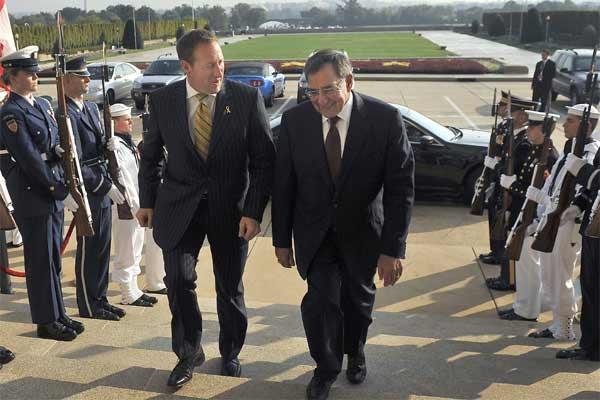Defense Secretary Leon Panetta said Syria has moved small amounts of its chemical weapons from secure sites and U.S. intelligence is unsure where those weapons ended up.
"We just don't know" the status of the stores of sarin nerve agent, mustard gas and cyanide in the Syrian stockpile that have been moved recently, Panetta said Friday at a Pentagon briefing with Canadian Defense Minister Peter MacKay.
"There has been some intelligence that … there has been some movement in order for the Syrians to better secure ... the chemicals," Panetta said. "So while there's been some limited movement, again the major sites still remain in place, still remain secure."
Panetta raised the scenario that the regime of President Bashar al-Assad may have lost control of some of the chemical weapons during the movements at the height of a civil war with the rebel Free Syrian Army.
"There has been intelligence that there have been some moves that have taken place. Where exactly that's taken place, we don't know," Panetta said. "I don't have any specific information about the opposition and whether or not they've obtained some of this or how much they've obtained and just exactly what's taken place."
When asked whether the Syrian rebels or factions from Iran's Revolutionary Guard, which has supported Assad, may have obtained any of the chemical weapons, Panetta said he had no "firm information to confirm that that's taken place."
Israel has warned that it might attack if Syria lost control of its chemical weapons stocks, believed to be the largest in the Middle East. President Obama has declared that the threat of chemical or biological warfare in Syria would be a "red line" for the U.S. that might bring military action.
Syria is one of eight states, including Israel and Egypt, which have refused to join the 1997 Chemical Weapons Convention requiring inspections by international agencies.
Syria has four main suspected sites for the storage of chemical weapons to include one north of Damascus, one near Homas, a third by Hama and fourth near Cerin. Smaller sites are located across the country.
Syria has neither confirmed nor denied that it has chemical weapon. In July, the Syrian regime declared that it would only use chemical weapons if foreign forces attacked on the side of the rebels.
"Any stock of W.M.D. or unconventional weapons that the Syrian Army possesses will never, never be used against the Syrian people or civilians during this crisis, under any circumstances," said Jihad Makdissi, a Syrian foreign ministry spokesman. "These weapons are made to be used strictly and only in the event of external aggression against the Syrian Arab Republic."
At the Pentagon briefing, which focused on Middle East issues, Panetta and MacKay said they remained united in their determination to stop Iran from developing nuclear weapons.
MacKay said Ottawa had recently closed its embassy in Iran to protect its diplomats and also send a message to Tehran that the allies were losing patience.
"There have been a number of red lines placed already, and Iran has edged closer and stepped over those red lines on a number of occasions now," MacKay said.





























